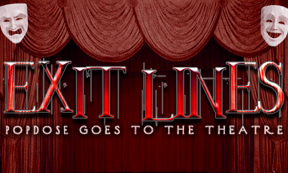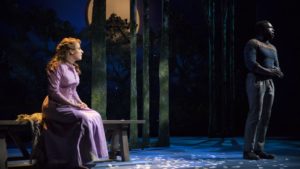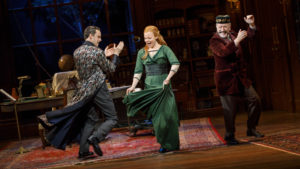 To review the Tony-nominated musicals of the recent past is a reminder of how small the number of Tony-nominated musicals that can profitably be revived on Broadway is. Shows as diverse as Bright Star, Nice Work If You Can Get It, and Memphis (the 2009 winner) can go on to half lives on tour and as theatre group favorites, but a second Broadway run is all but out of the question, as it is for the umpteenth movies-into-musicals that crowd a typical season. If Broadway revivals is one element that makes a Broadway musical canonical, the canon is small.
To review the Tony-nominated musicals of the recent past is a reminder of how small the number of Tony-nominated musicals that can profitably be revived on Broadway is. Shows as diverse as Bright Star, Nice Work If You Can Get It, and Memphis (the 2009 winner) can go on to half lives on tour and as theatre group favorites, but a second Broadway run is all but out of the question, as it is for the umpteenth movies-into-musicals that crowd a typical season. If Broadway revivals is one element that makes a Broadway musical canonical, the canon is small.
Rodgers & Hammerstein’s Carousel (1945, from before there were Tony Awards) and Lerner & Loewe’s My Fair Lady (1956, Tony winner) are unquestionably part of this exclusive club–no first names necessary for these legendary duos. Their standards are etched in our memories. But their books, adapted from venerable source material, are thought to pose challenges for contemporary audiences. I say “thought” because I prefer to think that audiences can roll with the punches that pop up between classic tunes (quite literally in the case of Carousel, where wife beating is a a plot point), and that adapters and think piece writers are making too big a deal out of all this. #MeToo is a valuable reckoning, and I hope a turning point. But it’s foolish to expect the past to be woke to today, as standards of acceptability shift at tweet speed. We should learn from what’s come before, not try to deny it, or bury it.
As it happens, audiences new to the stage versions of Carousel and My Fair Lady, as I was, may not notice anything out of the ordinary. (I only know the 1954 film version of the former, a botch, and the faithful transcription that is the 1964 adaptation of the latter, a Best Picture winner.) I regret missing the 1994 revival of Carousel, which, among other things, won Audra McDonald her first Tony Award (in the supporting category) and is said to have had book and score in perfect harmony. There’s no such equilibrium this time around, in what is best enjoyed as a concert version between talking. There is much to savor: former opera diva Renee Fleming, in her musical theater debut, bringing down the house with “You’ll Never Walk Alone”; the ensemble in a cheering “June is Bustin’ Out All Over”; Jessie Mueller and Joshua Henry’s plaintive “If I Loved You”; and Henry’s knockout first-act closer, “Soliloquy,” an eight-minute aria about fatherhood that every dad should listen to once in a while, as refreshment for the job. Thankfully, before he departed the film of Carousel, Frank Sinatra recorded “Soliloquy,” but he doesn’t blow the door off the hinges like Henry does. The cast album will be a treasure.
 Carousel is a reminder of how rich musicals can be. While many current shows are content to dish out the fast food, this is a full-course meal, with an elegant production (Santo Loquasto) that immerses you in New England of the late 19th century, and some exquisite ballet besides (Justin Peck is the choreographer). But the show isn’t as confident as Rodgers and Hammerstein’s later South Pacific and The King and I, and director Jack O’Brien has muddled it further. The show focuses on the star-crossed love and wayward marriage of carnival barker Billy (Henry) and millworker Julie (Mueller); he treats her poorly, curdles with frustration, and is killed before the birth of his daughter. Languishing in purgatory, he gets a chance at heavenly redemption if he can help Louise (Brittany Pollack), who at 15 is mocked for her parentage and has some difficult life choices to make.
Carousel is a reminder of how rich musicals can be. While many current shows are content to dish out the fast food, this is a full-course meal, with an elegant production (Santo Loquasto) that immerses you in New England of the late 19th century, and some exquisite ballet besides (Justin Peck is the choreographer). But the show isn’t as confident as Rodgers and Hammerstein’s later South Pacific and The King and I, and director Jack O’Brien has muddled it further. The show focuses on the star-crossed love and wayward marriage of carnival barker Billy (Henry) and millworker Julie (Mueller); he treats her poorly, curdles with frustration, and is killed before the birth of his daughter. Languishing in purgatory, he gets a chance at heavenly redemption if he can help Louise (Brittany Pollack), who at 15 is mocked for her parentage and has some difficult life choices to make.
This offbeat, and downbeat, scenario, adapted from Ferenc Molnar’s play Liliom, plays more smoothly in Fritz Lang’s 1934 film, which starred Charles Boyer. Not enough is made of the supernatural element, which here wastes the great John Douglas Thompson as the avuncular Starkeeper, and the musical’s happy ending comes too quickly and feels perfunctory. Reading about the show it’s clear that Rodgers and Hammerstein, uncertain where to go next after the legendary Oklahoma!, were also conflicted about it, and did what they could to dispel its darkness. Today the controversy resides in Julie’s embrace of her wife-beating husband, something Louise quizzes her about. Then, she accepted it (“the slaps felt like a kiss”); now, she says nothing, leaving us further confused about an already passive character, which the gifted Mueller brings to partial life only through her command of the songs. (Acting-wise, the show is stolen by Margaret Colin, who, like Thompson, has a non-singing role, that of the jealous carnival owner, and perks up the first act with her flinty performance.) Casting Henry, from The Scottsboro Boys, as Billy further clouds the issue by adding a racial dimension to the show; this is a difficult role to pull off, and while Henry nails the singing his performance is opaque. The best intentions to “update” Carousel have only bogged it down, stranded it in changing times.
 My Fair Lady has it easier. Director Bartlett Sher, a dab hand at R&H for Lincoln Center, pulls out the usual stops for L&L in the same venue, with a typically handsome production. George Bernard Shaw’s baked the gender and class conflicts into his play Pygmalion, and the adapters lifted much of it off the page as they converted them into song after glorious song (“Wouldn’t It Be Loverly?”, “The Rain in Spain,” and “I Could Have Danced All Night” for openers). The comically difficult transformation of flower girl “guttersnipe” Eliza Doolittle (Lauren Ambrose, in her terrific musical debut) by the stuffy linguist Henry Higgins (Harry Hadden-Paton, in his New York debut after West End shows and Downton Abbey), and the serious rift that roils their relationship after she’s successfully introduced as a member of London high society, is fully realized on the page and on the stage. (It wasn’t easy; Rodgers and Hammerstein had no luck with it. For an excellent history of the show, and Shaw, and phonetics, do purchase the Lincoln Center Theater Review at the Beaumont.)
My Fair Lady has it easier. Director Bartlett Sher, a dab hand at R&H for Lincoln Center, pulls out the usual stops for L&L in the same venue, with a typically handsome production. George Bernard Shaw’s baked the gender and class conflicts into his play Pygmalion, and the adapters lifted much of it off the page as they converted them into song after glorious song (“Wouldn’t It Be Loverly?”, “The Rain in Spain,” and “I Could Have Danced All Night” for openers). The comically difficult transformation of flower girl “guttersnipe” Eliza Doolittle (Lauren Ambrose, in her terrific musical debut) by the stuffy linguist Henry Higgins (Harry Hadden-Paton, in his New York debut after West End shows and Downton Abbey), and the serious rift that roils their relationship after she’s successfully introduced as a member of London high society, is fully realized on the page and on the stage. (It wasn’t easy; Rodgers and Hammerstein had no luck with it. For an excellent history of the show, and Shaw, and phonetics, do purchase the Lincoln Center Theater Review at the Beaumont.)
The cast is splendid: Norbert Leo Butz as Eliza’s wayward dad, Diana Rigg as Henry’s disapproving mum, Allan Corduner as Higgins’ faithful Major Pickering. Not a streetlamp or flower is out of place. Sher doesn’t mess with perfection, but he has made one addition, at the very end, which firmly grounds the show in our era. I’m not sure it was necessary, as what comes immediately before it, to set it up, almost makes it superfluous. When I saw the show, Hadden-Paton was working very hard on finding Higgins, perhaps a bit too hard (Rex Harrison, ideal now and forever, casts a very long shadow). “I’ve Grown Accustomed to Her Face” allows some warmth in, and he seemed to relax, freed of notes of caricature that he may have eliminated altogether some week later. But it’s Ambrose’s face that will haunt you. I wasn’t sitting very close, but I could see every expression that came across it, and she communicated so much–gratitude, tenderness, resolve. At 40, she may be “too old” for the part, yet a younger performer couldn’t convey so much expressively. I’m still thinking about it, how lived-in it was. In a few moments she’s Eliza and everywoman, and without prodding My Fair Lady is renewed for our cultural moment.





Comments